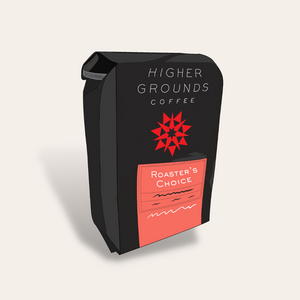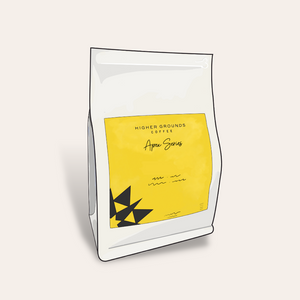Author's note: I traveled to the eastern Democratic Republic of Congo in May of this year, to participate in the third annual Saveur du Kivu and visit with Higher Grounds' producer partners at the Muungano coffee farmers cooperative.
road |rōd| noun
1. a wide way leading from one place to another, especially one with a specially prepared surface that vehicles can use. • the part of a road intended for vehicles, especially in contrast to a shoulder or sidewalk.
2. a series of events or a course of action that will lead to a particular outcome: he's well on the road to recovery. • a particular course or direction taken or followed: the low road of apathy and alienation.
The roughly-90-mile line between Bukavu and Kiniezire in the eastern Democratic Republic of Congo could be described as a road.
Traveling north out of Bukavu—a city of a million people on the southern shore of Lake Kivu—one could be fooled into thinking the day’s travels will be smooth. After all, 90 miles isn’t so far. Perched on a cushioned bench seat in the back of a sturdy Land Cruiser among haphazardly stacked luggage and a giant case of bottled water, I surveyed the landscape out the windows: the pristine lake to the east, lush jungle to the west, and ahead of us, a somewhat freshly-paved highway snaking north. After a few lulls in speed to navigate small clusters of people transporting any number of awkwardly-shaped items on their heads or backs (large bundles of sticks, flat baskets of small dried fish, 5-gallon jugs of water, stacks of fabric, bananas, buckets of small plastic bags filled with bright orange juice), soon we were careening at a comfortable pace up into the mountains. Deep ravines dropped down to the west, diverse vegetation thriving as far as I could see. We were cruising along.
On the road between Bukavu and Kiniezire, DRC from Higher Grounds Trading Company on Vimeo.
Until we weren’t. Pothole. Heavy brakes. Start again; gain speed. Quick maneuver to avoid a deeper fissure. Start again; gain speed. Repeat.
We had climbed into the Land Cruiser (arranged for us by Herman Chirihambali Lwango, On the Ground’s Congolese project manager) at eleven AM, paused briefly for groceries in Bukavu, then again for a bathroom break (I think—since the driver simply got out and disappeared for ten minutes) somewhere high and remote along the road. Six hours later, we coasted to a halt next to a long and narrow single-story building directly on Lake Kivu’s western shore in the village of Kiniezire, home base for the Muungano coffee farmers’ cooperative.
Higher Grounds has purchased coffee from Muungano for the past three years, and as the main writer on staff, I’ve spent a lot of time learning about the cooperative. The word “muungano” means “togetherness” in Swahili, reflecting the collaboration between native tribal groups formerly at odds who formed the co-op, putting aside their differences in the name of a brighter future for their communities. Each year, the coffee we’ve received from them has gotten better and better.
Upon disembarking from the Land Cruiser in Kiniezire, we—Beth Ann Casperson of Equal Exchange, my Higher Grounds colleague Joshua Brandt, and I—filed down a narrow hallway to our dormitory-style rooms, humble beds graced with shabby mosquito nets, musty bathrooms where we were instructed to turn the water on at the wall so that the toilet tank could fill before we flushed.
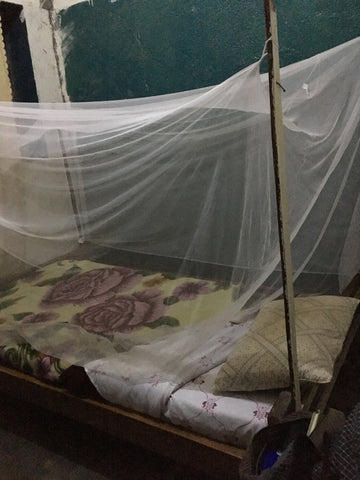
My dorm smelled more than faintly like an ill-kept rest stop bathroom, but I was too enamored by my natural surroundings to care: straight out the front entrance I walked, parting the laundry strung like a curtain across a stage, into the panoramic aura of Lake Kivu. A wooden fishing boat slouched in the reeds, framed by an evening sky of chalk pastels. At the western horizon, a hundred miles away, the Mt. Nyiragongo volcano pulsed a grey plume. The water was clear and still, reflecting the verdant shoreline at its edges. It was pure magic, a pristine universe seven thousand miles from my “normal” life.
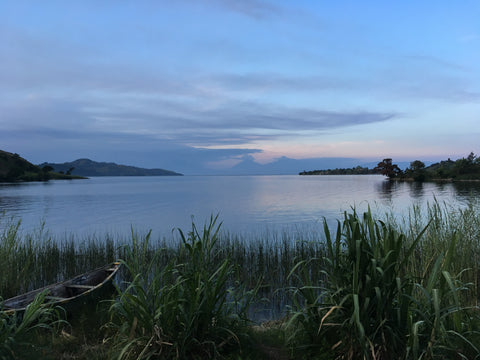
(Pictured: Lake Kivu at dusk.)
The next day, after a breakfast of passion fruit and buttery fried omelets, we arranged ourselves in one of those wooden boats along with Daniel Habamungu, Muungano’s general manager; Ismael Mipenda, Muungano’s staff cupper; Gideon, our translator; and another gentleman who appeared to be the captain, wielding a long, sturdy branch he used to shove us off from shore. By 8 AM we were en route to the community of Nyabirehe, home to one of Muungano’s washing stations and the first place for the GALS program to be implemented within the cooperative. (GALS—Gender Action Learning System—is a program of workshops and education focusing on gender equality.)
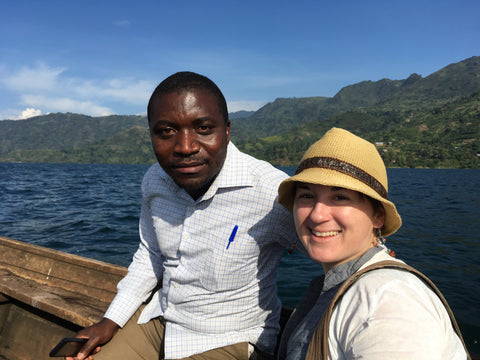
(Pictured: Daniel and me on the boat to Nyabirehe.)
After an hour on the boat, powered by a small outboard motor, we were greeted by community members and guided to their coffee processing facility. Their drying tables were few, but their parchment (unmilled coffee drying in the sun) was immaculate: smooth and uniform. After touring the washing station and talking with some of the first women to graduate from GALS about the accomplishments they’d achieved since (like purchasing more land for coffee production or planning a new roof for their house), we trekked up a few hundred feet in elevation to visit coffee plots owned by Mapende Mushuma and Bajuwe Nyaweza, pausing here and there for Beth Ann to share her observations and feedback about growing practices and health of the coffee plants, which, like those of most Congolese farmers, are decades old and in dire need of rehabilitation. The fact that their coffee is already achieving such high quality already speaks to the even greater potential for quality premiums once growing practices are improved. Barefoot children hovered around us (muzungu! muzungu! they cried, Swahili slang for white people!), some eager for photos, some skittering away shyly when we smiled in their direction.
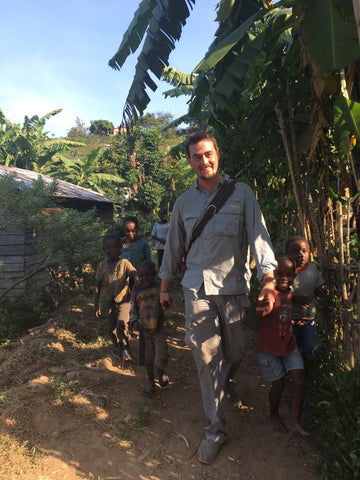
(Pictured: Josh Brandt of Higher Grounds with some new friends in Kiniezire.)
We were back from Nyabirehe by early afternoon and spent the rest of the day visiting Muungano’s administrative office and cupping lab, then touring the much larger main washing station at Kiniezire. We met Vedaste Nsengayesu, the soft-spoken manager, who explained each stage of processing.
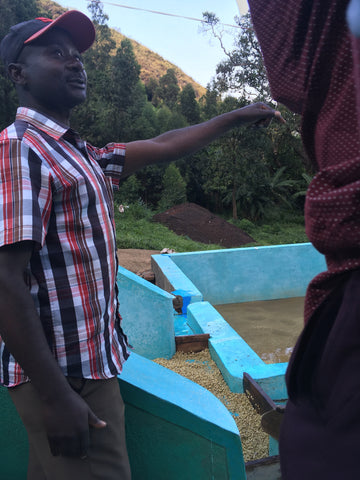
As we trailed away from the washing station along the main road through the village, we attracted dozens of children, becoming a parade, an uncommon attraction. Mud thatched huts lined the path, interspersed with the occasional brick house, all small, humble dwellings. I imagined myself settling into one of them for a month or two or three, calling Kiniezire my home and working for the cooperative, advising on quality control, learning processing systems, offering support wherever I could. Cassava leaves and fresh tilapia every day? I could get used to that. How much money would it take to set my “real” job aside for a while and live here, simply, unfettered in this remote and unspoiled place?
I let my imagination wander for more than a few minutes. Not practical, of course. I have responsibilities at home, diverse tasks at work, people who would miss me and whom I would miss. More than another body and two hands, the communities of Muungano need the work we are doing at home to share their stories and sell their coffee. So I pull myself out of that reverie. I focus on this work. I “introduce” coffee lovers to Ismael and Daniel and Vedaste, Mapende and Bajuwe and Herman. Though there are miles and miles of roads between us, their work forms the pulse of specialty coffee: a passion forming a brighter future for the DRC.
--Jennifer Yeatts, Director of Coffee
